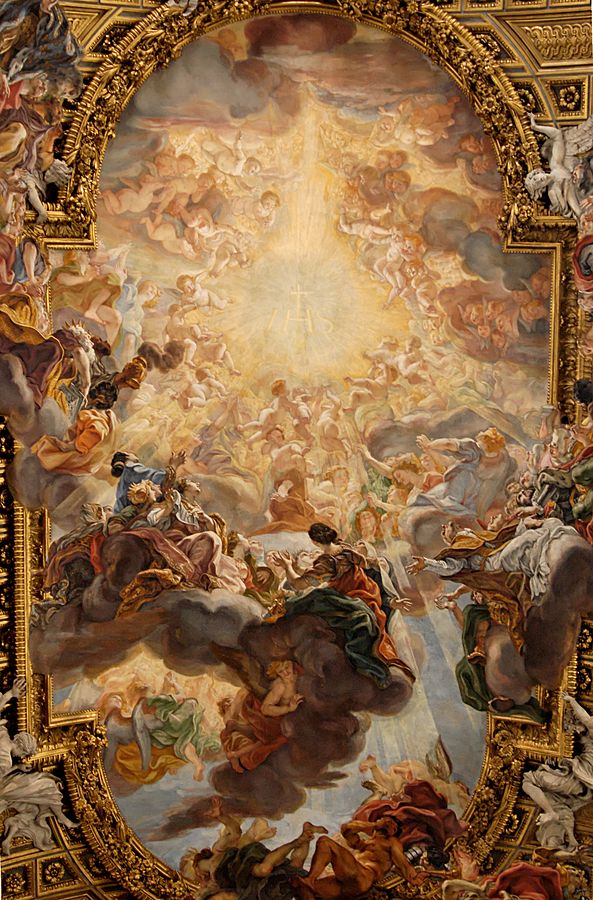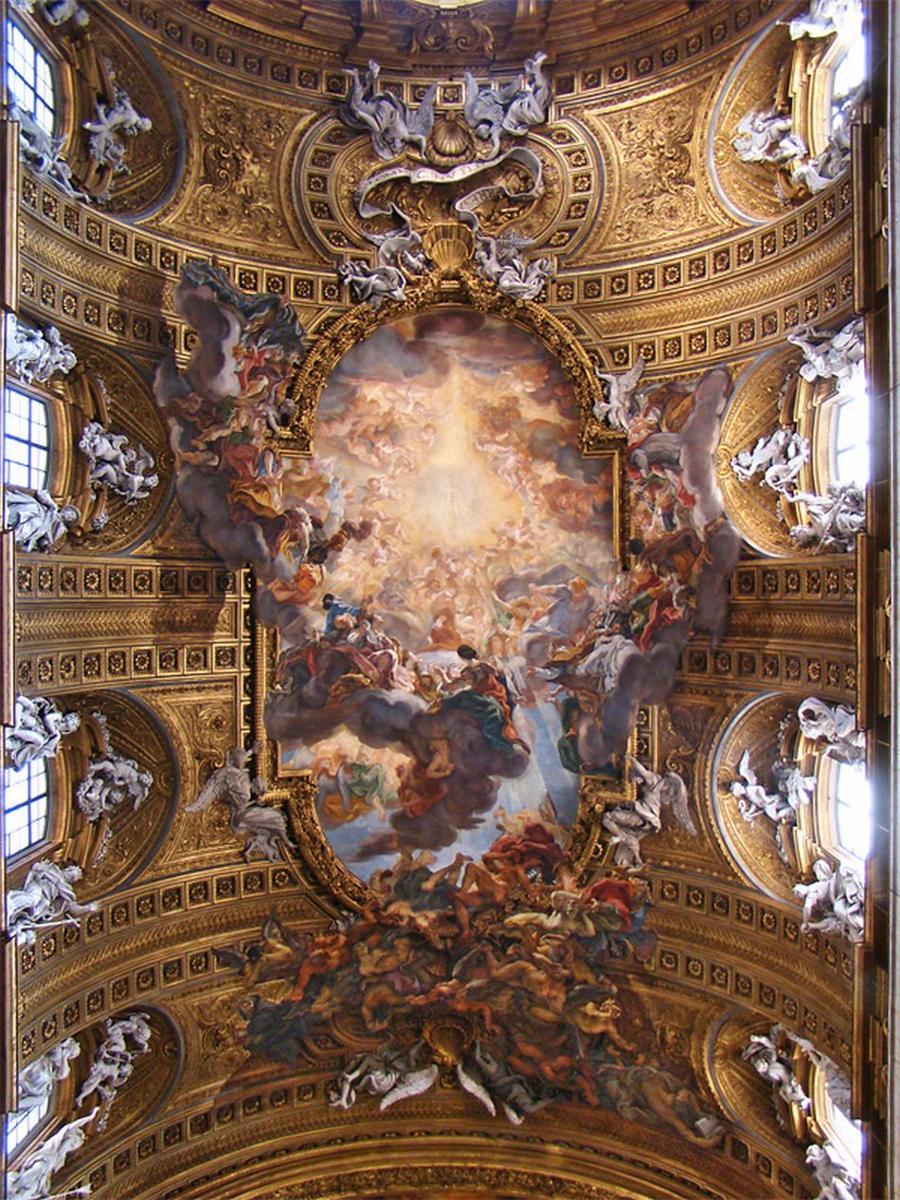December 6: Christ Emptied Himself for Us
♫ Music:
Day 5 - Thursday, December 6
Christ Emptied Himself for Us
Scripture: Philippians 2:5-11
Have this mind in you, which was also in Christ Jesus: who, existing in the form of God, counted not the being on an equality with God a thing to be grasped, but emptied himself, taking the form of a servant, being made in the likeness of men; and being found in fashion as a man, he humbled himself, becoming obedient even unto death, yea, the death of the cross. Wherefore also God highly exalted him, and gave unto him the name which is above every name; that in the name of Jesus every knee should bow, of things in heaven and things on earth and things under the earth, and that every tongue should confess that Jesus Christ is Lord, to the glory of God the Father.
Poetry:
Cloudless Snowfall
by Franz Wright
Great big flakes like white ashes
at nightfall descending
abruptly everywhere
and vanishing
in this hand like the host
on somebody's put-out tongue, she
turns the crucifix over
to me, still warm
from her touch two years later
and thank you,
I say all alone-
Vast whisp-whisp of wingbeats
awakens me and I look up
at a minute-long string of black geese'
following low past the moon the white
course of the snow-covered river and
by the way thank You for
keeping Your face hidden, I
can hardly bear the beauty of this world
HUMBLED BY BECOMING OBEDIENT
We live in an era of “give me mine and get out of my way.” It’s a me-first world where people cut in line, take what’s not theirs and never look back. Some things don’t change. The Apostle Paul, writing to the church in Philippi, reminded them that they lived in a “crooked and perverse generation” and that any good they pursued — such as refraining from grumbling (Phil. 2:14) — would make them shine like lights in a dark place (v.15). But grumbling feels so good; we default to it and other sins so easily. How can we become “blameless and innocent, children of God above reproach”? It starts in our minds. And the mindset we need is that of Jesus Himself.
The Apostle Paul, in today’s passage, puts forth what many have called a hymn — lyrics that could be sung, flowing in easy rhythm. Yet the words bring a hard, counter-cultural truth. To become changed people, we have to empty ourselves like Jesus did. We must get over ourselves, lifting our gaze to the needs of those around us. Verse 7 says Jesus “emptied Himself.” That phrase can be translated as laying aside His privileges. And we are a privileged people. If you are reading this, you have an education, you have a computer hookup or data phone plan, and access to WiFi or digital phone network. That puts you among an elite few on this planet. And of whom much is given, much is required (Luke 12:48).
My wife and I married later than many of our peers. For varied reasons, we had each become convinced that marriage was hard, fragile, fraught with potential for failure or heartache. Divorce was a harsh reality in her family. We began as friends trading letters and phone calls over 700 miles between Illinois and Georgia. We had each been in relationships that left us bruised, so we took things very slowly. And we made prayer and Bible study part of how we kept in touch. We chose Philippians as the focus of a Scripture memory project, and by quoting memorized passages over the phone, found God’s promises seeping into the crevices of our fear about what marriage could be. It wasn’t about us. It was about God in us. We chose Philippians as the theme for our wedding and had the reference for a verse in Philippians 2 carved into our wedding bands. It was on the teal napkins. After 31 years together, we are still learning what emptying ourselves means. But Jesus is a faithful and kind teacher.
The fresco we see on the page today is a blaze of light emanating from the center of a crowd of angelic and human worshipers, calling us to similarly bow in awe of who Jesus is. The light is at once beckoning and terrifying. Bach’s Christmas oratorio comes over us like a gentle blanket, guiding us, coaxing us into an emptying of ourselves in humble reverence for the One who teaches us still.
Prayer:
O Lord Jesus, why? Why would you stoop to
my lowly place, enter my dark world,
bring light where all seems impenetrably
bleak? I want to learn from you. And to
do that, I must learn to let go of what I
thought was mine, what I thought must
be grasped. As I do, I find you have given
me more than I left behind. For I have You.
Be exalted today in me — in my day, in my
night, and in the path you have set before me.
Michael A. Longinow, Ph.D,
Professor of Journalism
Department of Media, Journalism & Public Relations
School of Fine Arts & Communication
About the Artwork: (overall view and detail)
Triumph of the Name of Jesus, 1661-79
Giovanni Battista Gaulli
Ceiling fresco
Church of Il Gesù, Rome, Italy
The subject of the ceiling fresco of Il Gesù, the mother church of the Jesuit Order located in the heart of Rome, is the Triumph of the Name of Jesus. In a tour de force of theatrical Baroque illusionism Giovanni Battista Gaulli synthesizes the fresco seamlessly with the sculpted stucco by breaking the architectural frame to create a tumultuous yet exultant vision of divine glory. In keeping with the Council of Trent’s affirmation of the imagination and sensory experience as an essential means to spiritual devotion, the blinding light of the Christogram for Jesus, “IHS”, seems to burst through the ceiling, simultaneously sweeping the faithful up into heaven as the faithless fall into eternal darkness. Founded in 1540 by Ignatius Loyola (also known for his Spiritual Exercises), the Jesuit Order, or Society of Jesus, was devoted to taking Christianity to the far reaches of the world.
About the Artist:
Giovanni Battista Gaulli (1639-1709), also known as Baciccio was a late Baroque Italian artist who worked primarily in Rome after leaving his native Genoa. A protégé of Gian Lorenzo Bernini, he is best known for the ceiling fresco Triumph of the Name of Jesus in Il Gesù in Rome, one of the great masterpieces of theatrical Baroque illusionism and church decoration, a commission he received at the age of 22 on sculptor and architect Bernini’s recommendation. He was a distinguished painter of altarpieces who was also responsible for other fine decorative projects in Rome. At the height of his career, he was one of the most sought-after portrait painters in Rome. His late works evidence the lighter touch and palette of Rococo style.
About the Music:
“Christmas Oratorio, BWV 248, Cantata II: Pastoral Symphony (Sinfonia)” from the album The Best of the Academy
About the Composer:
Johannes Sebastian Bach (1685-1750) was a German composer, organist, harpsichordist, violist, and violinist of the Baroque period. He established German styles through his skill in counterpoint, harmonic and motivic organization, and the adaptation of rhythms, forms, and textures from abroad, particularly from Italy and France. Bach's compositions include the Brandenburg Concertos, the Mass in B Minor, The Well-Tempered Clavier, two Passions, keyboard works, and more than 300 cantatas, of which nearly 100 cantatas have been lost to posterity. His music is revered for its intellectual depth, technical command, and artistic beauty.
About the Performers:
The Academy of St Martin in the Fields, an award-winning chamber orchestra based in London, is one of the most recorded ensembles in the world. After its founding in 1959, the group’s work played a key role in a revival of Baroque performances in England. Originally a small string ensemble, the group often performs without a conductor and adds additional strings and winds based on the repertoire. Today’s recording features Academy co-founder and violinist Sir Neville Marriner (1924-2016), hailed as “one of the world’s greatest conductors.”
About the Poet:
Franz Wright (1953–2015) was an American poet. He and his father James Wright are the only parent/child pair to have won the Pulitzer Prize in the same category. He earned his BA from Oberlin College in 1977. In his precisely crafted, lyrical poems, Wright addresses the themes of isolation, illness, spirituality, and gratitude. Critic Helen Vendler wrote in the New York Review of Books, “Wright's scale of experience….runs from the homicidal to the ecstatic....His best forms of originality: deftness in patterning, startling metaphors, starkness of speech, compression of both pain and joy, and a stoic self-possession with the agonies and penalties of existence.” Wright received a Whiting Fellowship, a Guggenheim Fellowship, and a grant from the National Endowment for the Arts. He taught at Emerson College and other universities, worked in mental health clinics, and volunteered his time at a center for grieving children.
About the Devotional Writer:
Michael Longinow
Professor of Journalism
Biola University
Michael Longinow is the former chair of Biola's Department of Journalism and the advisor of Biola’s The Chimes student newspaper. Longinow attended Wheaton College, earning a BA in Political Science, and completed a PhD at the University of Kentucky. He has not only been an educator but has worked as a freelance reporter for the Chicago Tribune and Chicago Sun-Times. He was a founding adviser member of the Association of Christian Collegiate Media (ACCM), and now serves as its national executive director. Longinow is a frequent workshop presenter and panelist at national conventions, has written chapters for five books dealing with journalism, history, media and religion, and the popular culture of American evangelicalism. Longinow lives in Riverside, California, with his wife Robin and their three children, Ben, Matt and Sarah.

